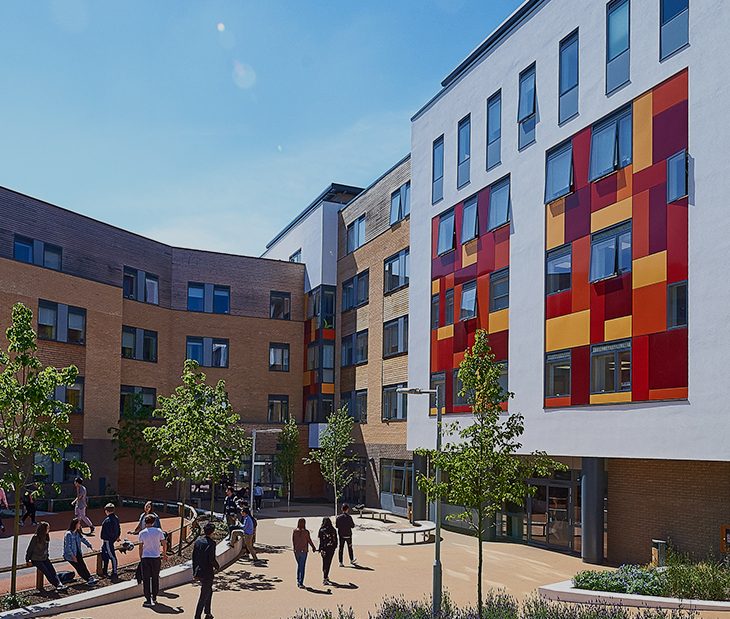A-Levels vs. IB Diploma: Which is the Right Choice for You
17th March 25

Choosing the right pre-university qualification is a crucial decision that can shape your academic and career trajectory. Among the most popular options, A-Levels and the International Baccalaureate (IB) Diploma stand out as two leading pathways for students aiming for top universities in the UK and worldwide.
Both qualifications are highly respected, but they differ significantly in structure, assessment style, and the skills they develop. So, which one is the better fit for you? In this blog, we break down the key differences, compare their advantages, and explore how Abbey DLD Colleges can help you achieve success.

What Are A-Levels?
A-Levels (Advanced Levels) are a UK-based qualification, recognised by universities around the world, that allows students to specialise in specific subjects based on the students area of interest. of their choice. Students are encouraged to select complimentary subjects that when combined, prepare them for a particular range of degree programmes for example students looking to study medicine would be encouraged to focus on Biology, Chemistry and either Maths or Physics at A Level. A levels are typically studied over two years (Years 12 and 13) and are recognised by universities across the world.
Key Features of A-Levels
- Subject Specialisation: Students usually study three to four subjects, focusing on areas aligned with their future university course or career aspirations.
- Assessment: Mostly exam-based, with some subjects incorporating coursework.
- Flexibility: No compulsory subjects – students have the freedom to choose what interests them.
- Grading: A* to E, with A* being the highest grade.

Who Should Choose A-Levels?
A-Levels are ideal for students who:
- Prefer in-depth study in a few subjects rather than a broad curriculum.
- Have a clear idea of their university and career path.
- Excel in exam-based assessments.
- Want the flexibility to focus on their strengths.
Students studying A Levels at the Abbey DLD Group of Colleges can take advantage of specialist university preparation alongside their A Level subjects. This personalised academic support helps student excel in their A-Levels, stand out from when applying to university, and therefore achieve top university placements.

What is the IB Diploma?
The International Baccalaureate (IB) Diploma is a globally recognised qualification designed to provide a broader education. Students study six subjects across different disciplines and complete additional core components that develop critical thinking and research skills.
Key Features of the IB Diploma
- Broad Curriculum: Students take six subjects, including languages, sciences, and humanities.
- Three Core Components:
- Theory of Knowledge (TOK) – Explores how knowledge is acquired and applied.
- Extended Essay (EE) – A 4,000-word independent research project.
- Creativity, Activity, Service (CAS) – Involves extracurricular activities and community service.
- Assessment: A mix of exams and coursework.
- Scoring: The maximum score is 45 points, with 24 needed to pass.
Who Should Choose the IB?
The IB Diploma is a great option for students who:
- Enjoy studying a broad and balanced range of subjects.
- Prefer a combination of exams, coursework, and independent research.
- Want to develop strong critical thinking and research skills.
A-Levels vs. IB Diploma: Key Differences
| Feature | A-Levels | IB Diploma |
| Subject Focus | Specialised (3-4 subjects) | Broad (6 subjects) |
| Flexibility | High – students pick any subjects | Less flexible – must study subjects from different groups |
| Assessment Style | Mostly exams | Mix of exams, coursework, and projects |
| Research Component | Optional (Extended Project Qualification – EPQ) | Mandatory (Extended Essay) |
| University Preference | UK and international universities recognise and value A-Levels | Globally recognised |
| Skills Developed | Subject mastery, analytical skills | Critical thinking, research, and time management |
| Workload | Focused on fewer subjects, allowing deep understanding | Intense workload due to multiple subjects and core components |
Both qualifications can lead to top universities, but the best choice depends on your learning style and academic goals.
University Recognition: A-Levels vs IB
Both A-Levels and IB are widely recognised by universities in the UK and internationally. However:
- UK universities are very familiar with A-Levels and may set specific grade requirements for each subject.
- The IB Diploma is highly regarded by universities in the US, Canada, and Europe, as it demonstrates well-rounded academic ability and independent research skills.
- Some competitive courses (e.g., Medicine, Law, Engineering) may prefer A-Levels due to their subject-depth.
At the Abbey DLD Group of Colleges, expert UCAS tutors guide students through the university application process, helping them maximise their chances of securing a place at a top-ranking institution.

Student Experience: Workload and Learning Style
The IB Diploma demands strong time management skills due to the balance between coursework, exams, and extracurricular activities. A-Levels, in contrast, allow students to focus on fewer subjects, with the focus on achieving top grades in specific areas.
Abbey DLD Colleges offer:
- Individual learning plans to help students stay on track.
- Regular academic check-ins and extra support when needed.
- Specialist preparation programmes for competitive university applications.
This personalised approach ensures students achieve academic excellence without feeling overwhelmed.

How Abbey DLD Colleges Support Your Academic Journey
At Abbey DLD Colleges, we provide tailored support to help students succeed in A-Levels.
- Specialist university preparation alongside the A Level subjects
- Personal Tutors: Every student receives guidance to develop independent learning skills.
- Top University Progression: Many students secure places at Russell Group universities and leading institutions worldwide
- Diverse Global Community: Study alongside students from different backgrounds while integrating into British culture.
- Small Class Sizes: More one-on-one interaction with expert teachers.
- Exceptional Boarding Facilities: Safe, high-quality accommodation with 24/7 pastoral care.
- Extracurricular Excellence: Opportunities to participate in competitions like the British Mathematical Challenge, Cambridge Chemistry Challenge, and ISA National Art Competition.
Our students thrive in a supportive, academically ambitious, and globally-minded environment.
Final Thoughts: Which Should You Choose?
- Choose A-Levels if you want flexibility in subject choices and prefer to specialise on subjects linked to the degree you wish to study.
- Choose the IB Diploma if you enjoy a broad curriculum and wish to develop critical thinking and research skills.
Both pathways can lead to top universities, and at Abbey DLD Colleges, we ensure that every A-Level student receives the best preparation for success.
FAQs
- Which is better for university admissions: A-Levels or the IB Diploma?
Both qualifications are highly regarded by universities in the UK and worldwide. A-Levels are the standard qualification for UK universities and provide subject specialisation, making them an excellent choice for students with a clear career path. The IB Diploma is widely accepted globally and is a good choice for students considering international university options. Both qualifications are highly regarded, and the best choice depends on the student’s academic strengths, learning preferences, and future goals.
- Do A-Levels or IB require more workload?
The IB Diploma is often considered more demanding because it requires students to study six subjects across different disciplines, alongside additional components such as the Extended Essay (EE), Theory of Knowledge (TOK), and Creativity, Activity, Service (CAS).
On the other hand, A-Levels focus on 3-4 subjects, allowing for greater depth in each. While the workload can still be challenging, A-Levels provide more flexibility to specialise in subjects of interest.
- Which qualification is easier: A-Levels or IB?
The difficulty level depends on individual learning styles and preferences.
- A-Levels might be easier for students who excel in specific subjects and prefer exam-based assessment, but the subjects will be covered in greater depth and complexity
- IB follows a broader curriculum, so although the level of subject depth and complexity will not be as great as A-Level, it can be challenging due to its broad curriculum and additional coursework requirements.
If you enjoy focusing deeply on a few subjects, A-Levels may be a better fit. If you prefer a holistic, rounded education, the IB might be more suitable.
- Can I study A-Levels if I want to apply to a university outside the UK?
Yes! A-Levels are internationally recognised and widely accepted by universities worldwide, including in the USA, Canada, Australia, and Europe. Many top institutions outside the UK have standardised entry requirements for A-Level students. Abbey DLD Colleges also provide specialist UCAS guidance to help students secure places at leading universities in the UK.
- What subjects should I choose for A-Levels to keep my options open?
If you’re unsure about your future career path, it’s best to choose versatile A-Level subjects that are well respected by universities. Some of the most flexible and widely accepted A-Level subjects include:
- Mathematics – Highly valued across various degree programs.
- Sciences (Physics, Chemistry, Biology) – Ideal for STEM careers, including Medicine and Engineering.
- English Literature – Strong for humanities and law-related courses.
- Economics – Useful for business, finance, and social sciences.
Abbey DLD Colleges offer a wide range of A-Level subjects, allowing students to tailor their studies to their strengths and career aspirations.





